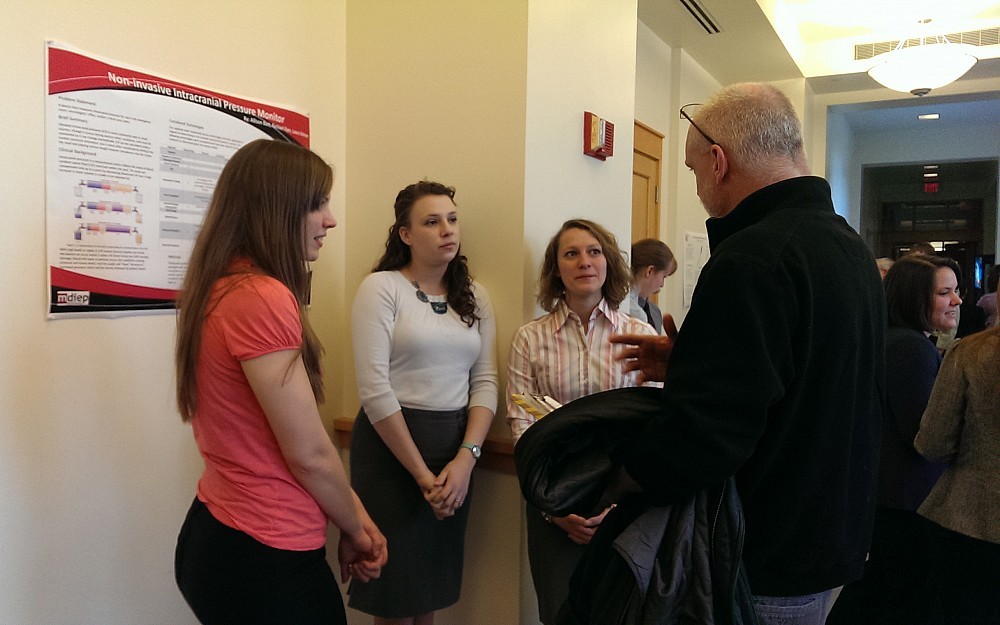
Faculty Partner with Student Innovators for Medical Device Design
Working to solve real-life clinical problems, a group of College of Medicine faculty spent most of their academic year in partnership with University of Cincinnati design and engineering students.
Their work was part of UC's Medical Device Innovation & Entrepreneurship Program (
), which regularly pairs faculty and industry with students from business, engineering and design fields.
"This is a multi-disciplinary hands-on course that is intended to work on problems that are real and that will help people, says Mary Beth Privitera, MDesign, research associate professor of emergency medicine and MDIEP co-director. "The clinical faculty members are incredibly supportive and allow the students to routinely visit clinical care sites for advanced understanding.
Housed within UCs Department of Biomedical Engineering, MDIEP closes its year of work with an annual competition in which students pitch their medical devices to mock investors.
At "Do it or mDIEp Day, held Friday, March 14, teams presented their designs to "investors from the UC and local industry community. This year, 11 teams competed, with millions of "Bearcash dollars at stake.
First place, raising $3.75 million in "Bearcash dollars, went to team "Vascular Access for Obese Patients. The device, a curved hypodermic needle to help facilitate intravenous access for obese patients, was designed by students Mike Boyd, Kyle Kausch and Theodore Stazak.
Associate professor of emergency medicine Andra Blomkalns, MD, was the teams clinical advisor. Faculty advisors were Privitera and Balakrishna Haridas, PhD, associate professor educator of biomedical engineering.
Second place ($3 million) went to two teams:
- "EFT Assurance: Pediatric Nasogastric Feeding Tube Detection Device: Students Megan Menke, Amechi Omameh and Dustin Samm designed a device that can confirm enteral (passing through the intestine) feeding tube placement for pediatric patients.
The American Society for Parenteral and Enteral Nutrition was the teams clinical partner. Privitera, Haridas and Fred Beyette, PhD, professor of electrical engineering and computer systems, served as faculty advisors.
- "ClearView: Speculum Retractor for Pelvic Exam: Team members Andrew Kordahi, Kerry OConnell, Andrew Robinson and Cristyn Scarbrough created a device that retracts excess internal tissue for use in pelvic exams of obese patients.
Blomkalns and Mary South, MD, adjunct assistant professor of obstetrics and gynecology, served as clinical advisors. Faculty advisors were Privitera and Haridas.
Third place was also a tie, with $2.25 million in Bearcash going to:
- "Heist II: Suction Laryngoscope: Students Ryan Brooks, Omar Al-Refaei, Angelo Cruz and Ken Okoye designed a solution for removing liquid from the pharynx for proper placement of an endotracheal tube during intubation.
The teams clinical partner was Mel Otten, MD, professor of emergency medicine. Faculty advisors were Privitera and Haridas.
- "Abscess Packing Device, a device that dispenses an adjustable amount of standard packing tape to assist in packing subcutaneous abscesses. It was designed by Katie Hunt, Laura Thesing, Sophie Kinkle and Thomas Baldauf.
The teams clinical partner was Arthur Pancioli, MD, Richard C. Levy Professor and chair of the department of emergency medicine. Faculty advisors were Privitera and Haridas.
"There is no compensation for our clinical partners and we greatly appreciate their willingness to participate in the education of our students, says Privitera. "In fact, without the support of several routine collaborators (Emergency Medicine, Endovascular Neurosurgery, & ENT) we would not be successful. These departments have had considerable positive impact on our program.
Read about the other teams devices at:
http://ceas.uc.edu/news-1314/mdiep-day-showcases-newly-minted-biomedical-engineering-innovati.html
.
Related Stories
Preparing students for artificial intelligence in education
May 8, 2025
Laurah Turner, PhD, associate dean for artificial intelligence and educational informatics at the University of Cincinnati's College of Medicine, recently joined the For The Love of EdTech podcast to discuss the usage of personalized learning and AI coaches to enhance educational experiences.
UC lab-on-a-chip devices take public health into home
May 8, 2025
University of Cincinnati engineers created a new device to help doctors diagnose depression and anxiety. The “lab-on-a-chip” device measures the stress hormone cortisol from a patient’s saliva. Knowing if a patient has elevated stress hormones can provide useful diagnostic information even if patients do not report feelings of anxiety, stress or depression in a standard mental health questionnaire.
UC researcher launches app to connect patients to lifesaving...
May 7, 2025
A cardiologist and researcher at UC’s College of Medicine joined the Venture Lab at the 1819 Innovation Hub to launch High Enroll, an app that links clinical trials with willing participants.
